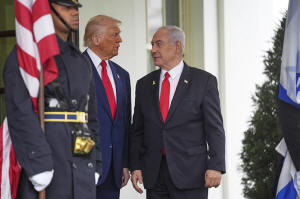Netanyahu-Trump meeting reveals unexpected gaps on key issues
[April 09, 2025]
By TIA GOLDENBERG
TEL AVIV, Israel (AP) — Israeli Prime Minister Benjamin Netanyahu
traveled to Washington for a hastily organized White House visit
bringing a long list of concerns: Iran's nuclear program. President
Donald Trump's tariffs. The surging influence of rival Turkey in Syria.
And the 18-month war in Gaza.
Netanyahu appeared to leave Monday's meeting largely empty-handed — a
stark contrast with his triumphant visit two months ago. During an
hourlong Oval Office appearance, Trump appeared to slap down, contradict
or complicate each of Netanyahu’s policy prerogatives.
On Tuesday, Netanyahu declared the meeting a success, calling it a “very
good visit” and claiming successes on all fronts. But privately, the
Israeli delegation felt it was a tough meeting, according to a person
familiar with the matter who spoke on condition of anonymity in line
with regulations.
Netanyahu “didn’t hear exactly what he wanted to hear, so he returns
back home with very little,” said Nadav Eyal, a commentator with the
Yediot Ahronot daily, who added that the visit was still friendly,
despite the disagreements.
Netanyahu's second pilgrimage to Washington under Trump's second term
was organized at short notice and billed as an attempt to address the
new U.S. tariff regime. But it came at a pivotal time in Middle East
geopolitics. Israel restarted the war in Gaza last month, ending a
Trump-endorsed ceasefire, and tensions with Iran are rising over its
nuclear program.

Netanyahu and his allies were thrilled with Trump's return to office
given his strong support for Israel during his first term. This time
around, Trump has not only nominated pro-Israel figures for key
administration positions, he has abandoned the Biden administration's
criticism of Israel's conduct in Gaza and the West Bank, and of
Netanyahu's steps to weaken Israeli courts.
Monday's meeting showed that while Trump remains sympathetic to Israel,
Netanyahu's relationship with the president during his second term is
more complicated and unpredictable than he may have expected.
Here is a look at where Trump and Netanyahu appear to have diverged.
Netanyahu has long pushed for military pressure against Iran
With Netanyahu's strong encouragement, Trump in 2018 unilaterally
withdrew the United States from the agreement between world powers and
Iran over its nuclear program. That deal, negotiated by the Obama
administration, put curbs on Iran's nuclear program. It was denigrated
by Netanyahu because he said it did not go far enough to contain Iran or
address Iran's support for regional militant groups.
Netanyahu has long maintained that military pressure was the best way to
prevent Iran from obtaining nuclear weapons. Israel struck Iran last
year in the countries' first direct conflict ever. But it did not target
Iran's nuclear facilities, something Israel would likely need U.S.
military assistance to do in order to strike targets buried deep
underground.
Trump has suggested, including on Monday, that the U.S. could take
military action if Iran doesn’t agree to negotiate. But his announcement
Monday that talks would take place between the U.S. and Iran this
weekend flew in the face of Netanyahu’s hawkish views.

Netanyahu gave a tepid endorsement, noting that both leaders agree that
Iran cannot develop a nuclear weapon. He said he would would favor a
diplomatic agreement similar to Libya's deal in 2003 to destroy its
nuclear facilities and allow inspectors unfettered access. However, it
is not clear if Trump will set such strict conditions.
Eyal said the announcement with Netanyahu by Trump's side was meant to
show the transparency between the countries' leadership.
Netanyahu hoped for tariff relief and appeared to be rebuffed
A day before Trump's so-called Liberation Day unleashed global tariffs
on the world last week, Israel preemptively announced that it would
eliminate all levies on U.S. goods. But that didn't spare Israeli
products from being slapped with a 17% tariff by its largest trading
partner.
[to top of second column]
|

President Donald Trump, left, greets Israel's Prime Minister
Benjamin Netanyahu at the White House, Monday, April 7, 2025, in
Washington. (AP Photo/Evan Vucci)

Netanyahu was summoned to Washington ostensibly to make Israel's
case against the levy. He was the first international leader to do
so, in an encounter that may have set the stage for how other world
leaders approach the tariffs.
While Trump repeatedly praised the Israeli leader, he did not appear
to budge on Israel's share of the burden. Asked if he might change
his mind, he said “maybe not.” He cited the billions of dollars the
U.S. gives Israel in military assistance each year — money that is
seen as the bedrock of the U.S.-Israel relationship and an insurance
policy for U.S. interests in the region.
“We give Israel $4 billion a year. That’s a lot,” he said, as though
to suggest Israel was already getting enough from the U.S., and
congratulated Netanyahu on that achievement.
Netanyahu was told to be reasonable on Turkey
Since the fall of the Assad dynasty in Syria late last year, Israel
and Turkey have been competing in the country over their separate
interests there. Israel fears that Syria's new leadership, which has
an Islamist past, will pose a new threat along its border. It has
since taken over a buffer zone in Syrian territory and said it will
remain there indefinitely until new security arrangements are made.
Turkey has emerged as a key player in Syria, prompting concerns in
Israel over the possibility of Turkey expanding its military
presence inside the country. Netanyahu said Tuesday that Turkish
bases in Syria would be a “danger to Israel.”
Once strong regional partners, ties between Israel and Turkey have
long been frosty and deteriorated further over the war in Gaza.
Turkish President Recep Tayyip Erdogan has been an outspoken critic
of the war, prompting angry reactions from Israeli officials.

Netanyahu sought to hear support from his stalwart ally Trump on a
country Israel perceives as increasingly hostile. Instead, Trump
lavished praise on Erdogan for “taking over Syria,” positioned
himself as a possible mediator between the countries and urged
Netanyahu to be “reasonable” in his dealings with the country.
“Israel is not provided with a blank check here,” said Udi Sommer,
an expert on U.S.-Israel relations at Tel Aviv University. “There’s
no unconditional love here. It is contingent. It is contingent on
Israel behaving a certain way.”
Trump wants the war in Gaza to end
While both addressed the ongoing war in Gaza and the Israeli
hostages who remain held there, the topic appeared to take a
backseat to other issues.
Netanyahu spoke of the hostages' plight and an emerging deal to free
them, as well as the need to end the “evil tyranny of Hamas.” Trump
sympathized with the hostages and made another pitch for his plan to
“own” Gaza and remove its Palestinian population, a once fringe idea
in Israeli discourse that has now found acceptance among mainstream
politicians, including Netanyahu.
However, there were signs of differences on the horizon.
Netanyahu broke the ceasefire last month and has been under major
pressure from his governing allies to keep up the fighting until
Hamas is crushed. He has appeared to be in no rush to end the war or
bring home the remaining hostages.
Trump, however, made it clear that he'd like to see the hostages
freed and for the war to end. “And I think the war will stop at some
point that won’t be in the too distant future,” he said.
All contents © copyright 2025 Associated Press. All rights reserved
 |